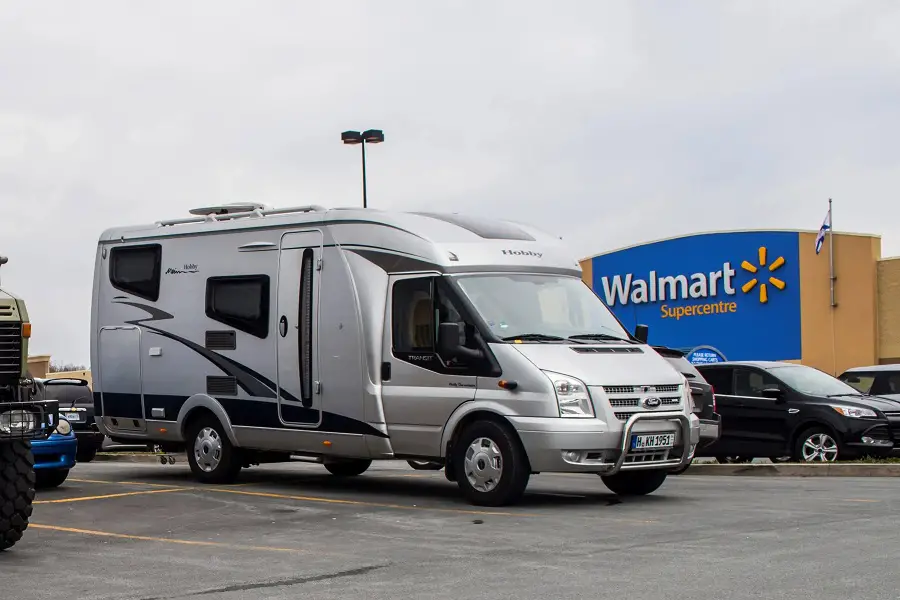There are plenty of us that adopted the idea of camping, and never had the chance to stargaze under old pine trees from a young age.
When you hit adulthood, it feels like there’s too much equipment, know-how and information to learn, but that’s where we come in to help.
This is a one-size-fits-all guide to tell you everything a beginner needs in order to have a successful, relaxing, and fun camping experience.
What You Need to Bring, and Why
Let’s cover your gear and why it’s so important to kick things off.
Quality Sleeping Bag
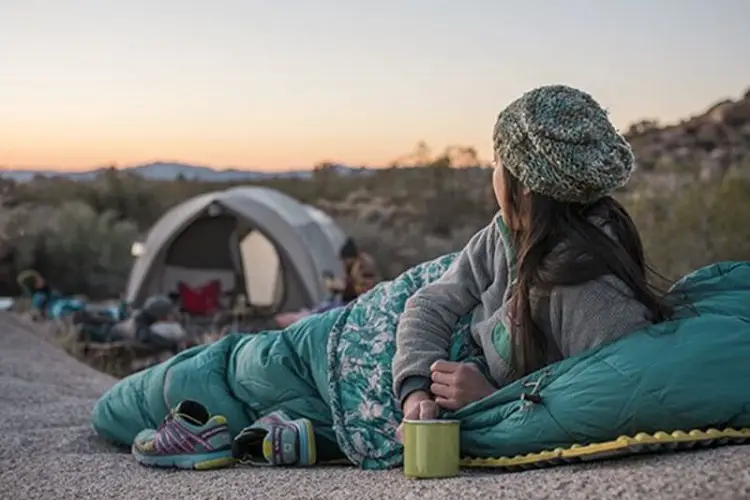
If you can’t get a good night’s rest, you’re going to have a wretched time for the rest of your camping trip.
Your sleeping bag should be built to last you for over a decade, which is why we recommend opting for quality over quantity.
Searching the discount rack for quality rarely goes well; you need a good temperature rating for the type of camping you’ll be doing and a lightweight build for optimal packing.
Proper Tent w/ Accessories
Make sure you have your tent stakes, a mallet to hammer them in, the poles, and of course, the tent itself.
Having a proper tent (not whatever’s cheapest) is what makes you feel like you have everything all together when you’re at the campsite.
You should have enough room to comfortably house yourself, your backpack, your sleeping bag, and your party size if you’re not solo camping.
Survival EDC Kit
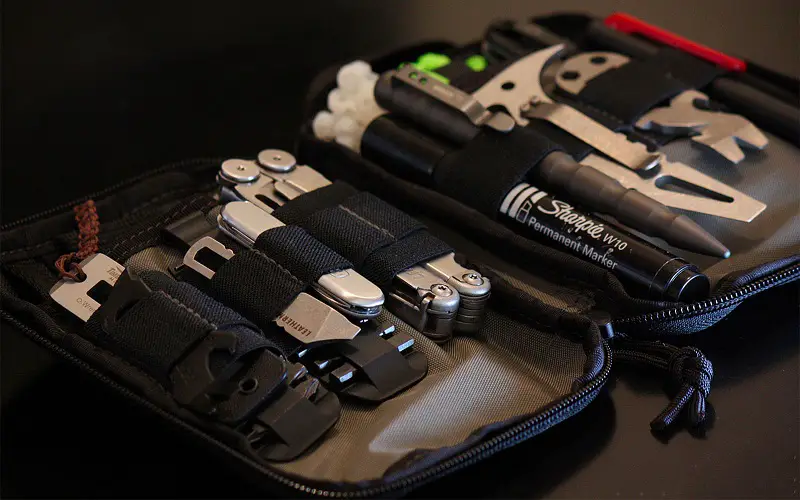
We’ve done an entire guide on what you should have in your survival EDC kit.
This is your go-to bag that never fails, the kit that helps you get out of numerous sticky situations, including worst-case scenarios.
This includes self-defense and self-preservation items, and you should never leave for the campsite without it.
Light Source
Headlamps, lanterns, and of course you’ll be using your campfire as a light.
Having a light source (that isn’t flashlight mode on your phone) is critical to enjoying camping at night, and having a quick way to get your bearings if you hear noises around the tent. Roll over, flick on the lantern, and you’re in control.
If you get lanterns with a high lumen output, they can be seen for 2,000+ feet and provide enough concentrated light to act as a self-defense method by blinding wild animals or assailants.
The survivalist comes out in all of us at one point, and this is another ace in the hole.
Fire Starter(s)
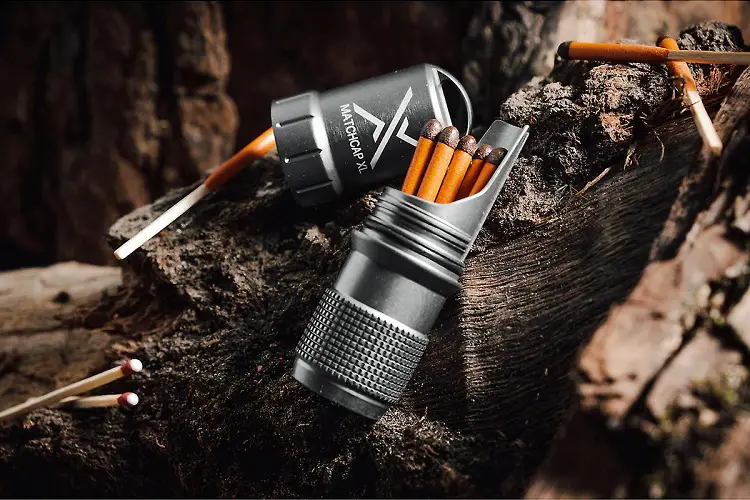
Fire starters are superior to matches and far superior to lighters. You don’t want to end up rubbing two rocks together because the lighter doesn’t work or the matches got wet.
Most fire starters can be used between 3,000 and 5,000 times before needing to be replaced, and cost around $5.00 or a little more.
Dried/Prepped Food w/ Equipment
You don’t have to ransack the beef jerky on the aisle toppers in your local Walmart, but bringing along dried food is recommended.
You can make your own dried foods and trail mix at home, but at the same time, there’s nothing wrong with bringing a portable camping grill and some fresh meat for the ride.
If you do this, don’t overpack and bring your entire kitchen outdoors, only bring what you need to turn the meat, store it, and of course, some silverware to eat with.
Quality Camping Knife
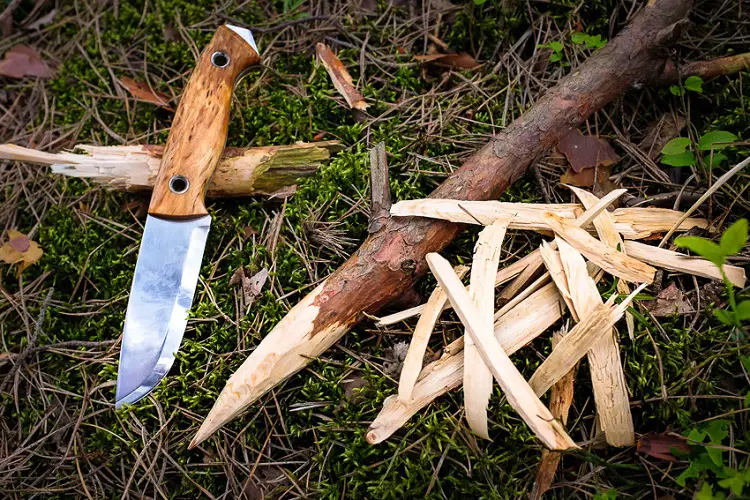
No matter who you talk to, they’ll all agree: your camping knife is your most valuable asset out in the great outdoors.
Between being a multifaceted utility device and a self-defense weapon, among other things, this is your companion that will always be on your hip.
It’s not uncommon to spend $80.00+ on a good knife. Look for partially serrated edges, and additional materials on the blade finish, and ensure they meet the local municipality knife length laws for the area you’ll be camping.
Tarp/Umbrella
You need an umbrella at the very least, but if you’re bringing a tent, you should pack a tarp.
Most tents are water resistant, not waterproof, meaning the water will bead up and roll off in most scenarios, but leaks are still bound to occur.
A good tarp doesn’t have to cost a lot of money and usually packs up small right in the same area as your tent.
Quality Hiking Boots
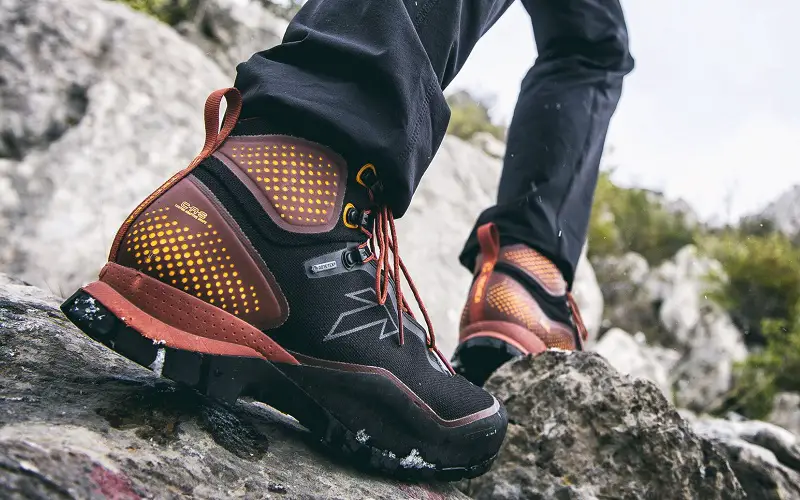
Even if you’re not going to head out on a hike, you still need the traction of a pair of quality hiking boots.
Walking from point A to point B on the campsite includes unknown risks, because that’s the point: this isn’t a series of paved roads in the middle of a city, you need to be ready for slippery patches of leaves, loose dirt, and surface-bound tree roots that you didn’t originally see.
Fishing Gear
Heading out in the great outdoors means you have nothing but time, so why not pull up a fishing line and just lose yourself on the water?
Fishing puts you right in the thick of the outdoors, but the gear can be a hassle. You need hooks, bait and tackle, and of course the pole itself, but nothing else.
The hassle comes into play when you’re storing fish hooks. Wrap them in tin foil to prevent rust and puncture wounds, and put those in a plastic container with a lockable lid during transit.
Patch Repair Kits
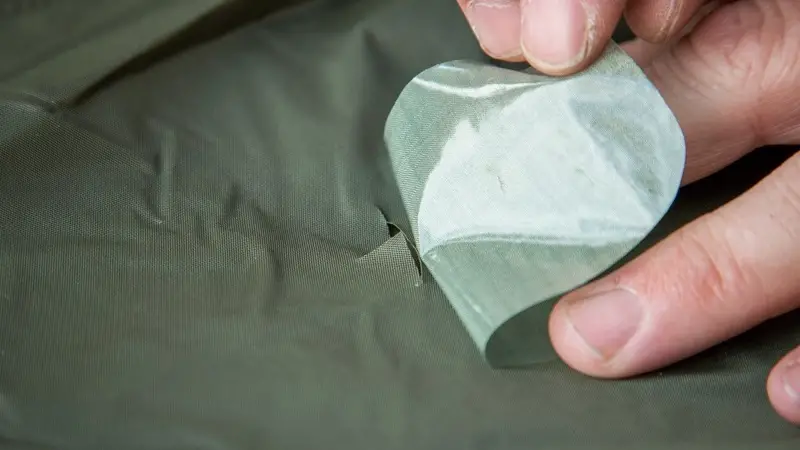
Patch and repair kits are essential, especially if you’re camping in cold conditions.
You want to preserve the integrity of your tent or sleeping bag or whatever is ripped, but you also want to maintain the temperature rating.
Patch kits usually come with materials that help insulate, and include all the necessary items to put it into full use.
First-Aid
This should go without saying, but first-aid is always a necessity. The problem is, when you’re going camping, you get all amped up and don’t think that you need it. First-aid kits don’t have to be cookie-cutter models that you buy online, either.
You can save a ton of money by cherry-picking the necessities in your kit and purchasing individual items.
Ensure you have burn creme, bandages, and antibacterial protectants in order to prevent infections above all else.
Buying a 100-piece first-aid kit sounds great until you realize that 70 of those are individual band-aids. Custom make the kit.
Golden Rules of Maintaining Your Camping Equipment
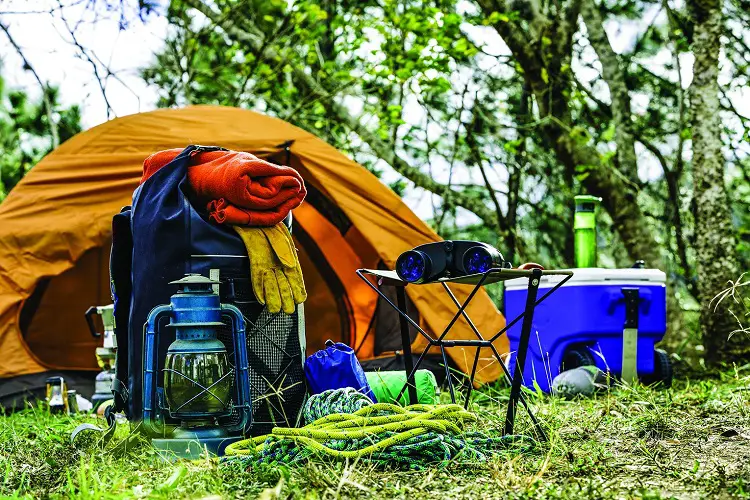
You can sink a lot of money into quality pieces of camping gear, and there’s nothing wrong with that, but don’t neglect them after they perform as needed.
Great camping equipment can last you for decades and even be passed on to the next generation if you take care of everything. These are the golden rules of maintaining your camping equipment at any stage of experience.
- Keep everything organized. This seems like a rather bland tip, but if you aren’t keeping your gear organized, it’s going to clash around together. Nothing is going to dull your knife worse than banging against the handle of your multitool, you’ll scuff up your pots and pans, and don’t be surprised if a flashlight lens shatters. Avoid all of that by keeping it organized.
- Keep your gear waterproofed. You can buy a simple waterproofing spray (that’s usually designed for shoes and boots), and keep your tent, sleeping bag, and backpack high and dry. You’ll have to use this spray every three to six months, or more frequently if you camp often, to keep rust at bay.
- Don’t assume a patch kit is going to last forever. If you tear a hole in your tent or your backpack, a patch kit is good to get you through the trip without compromised gear, but you still need to get it professionally repaired. Look at mail-in repair services offered by major outdoor gear providers or find local repair shops to get a permanent fix.
- Wash your camping gear according to the packaging instructions. These can be fairly aggravating to follow, but you’ll be able to ensure that you’re not only upholding the warranty terms, but you’ll be preserving a potentially lifelong investment in your camping gear.
- Store your equipment in a safe space at home. Somewhere cool, dry, and if you have little ones, your gear should be out of reach. Partially for their own safety, but also so your gear doesn’t get ruined from them tugging on the bottom of a coat in the hallway closet.
How to be a Minimalist and Still Have All the Necessary Gear
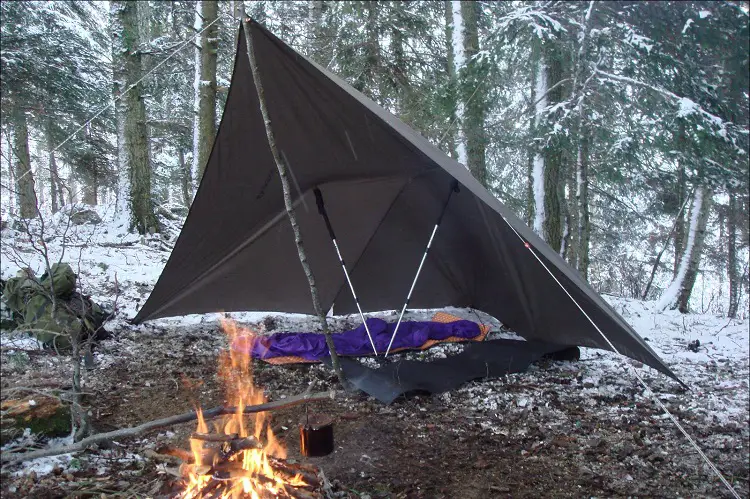
Minimalist campers are confident and sure of themselves because they’ve been around the rodeo more than a few times before.
In our opinion, starting out as a minimalist camper is extremely difficult without prior experience, so you should ease your way into it.
That being said, there are a few corners you can cut to adopt the mindset of a minimalist camper while still feeling comfortable and secure with your gear.
- You can still get a sleeping bag, but if you’re going camping in the middle of July, you don’t need a 32 F or lower temperature rating. Look for ultralight or lightweight sleeping bags with a range of 43 F and above, which not only saves you money but keeps things lighter when you’re packing.
- Opt for multitools instead of designated individual pieces of equipment. If you’re already good with your hands or work in a trade where tools are like extensions of yourself, get a Swiss Army Knife and general plier-based multitool. You can save a lot of carrying weight and storage space by doing this.
- Get one bag for everything. One backpack, whatever size you need, but avoid having more than a single bag with you for any of your necessities. A 55L to 70L bag may be heavy when full, but it beats holding multiple bags that throw off your center of gravity.
Your Equipment Is Nothing Without You
Even the best equipment in the world is nothing without a skilled set of hands to guide it. You’re the key component to making gear work, and you deserve quality gear that’s going to work for you.
We’ve compiled guides on the best camping and RV gear to get the job done, so whether you’re a beginner or a seasoned veteran, there’s a little bit of something for everyone here on Kempoo.
There are checklists, guides on managing and maintaining your equipment, and a whole lot more to get you in the camping spirit and carry you through your camping trip like a champion.
References:


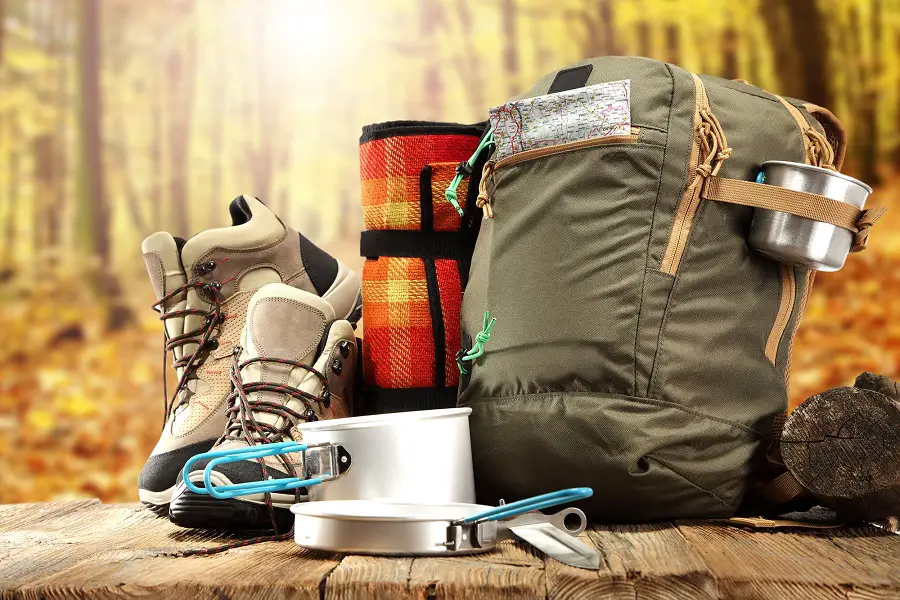

![9 Final Thoughts And Items For Your First Camper Adventure [Checklist] 12 RV Camping Checklist](https://kempoo.com/wp-content/uploads/2018/11/first-camper-adventure.jpg)
